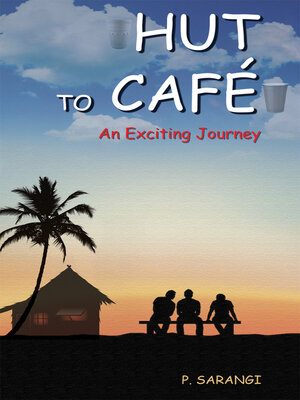
Sign up to save your library
With an OverDrive account, you can save your favorite libraries for at-a-glance information about availability. Find out more about OverDrive accounts.
Find this title in Libby, the library reading app by OverDrive.



Search for a digital library with this title
Title found at these libraries:
| Library Name | Distance |
|---|---|
| Loading... |
The title of the book 'HUT TO CAFÉ' (An Exciting Journey) speaks about some real-time
events we face in our lives at different points of time. With changing times, we change our lifestyle
under the pretext of circumstantial compulsion and keeping pace with the modern age. After acquiring a
little education and wealth, some start feeling elevated and underestimate the illiterate and poor.
Thus, a new class division is created – rich and poor.
Birju's 'Hut Sadabahar' is a roadside hay-roofed tea shop in a village. It serves tea and homemade
nimki in backed clay cups and green-leaf bowls to the passersby. The Hut symbolizes a simple
livelihood, healthy food and drinks in a hygienic environment, and the development of communication
skills in the buyer-seller environment.
Impressed by the clean environment, the excellent quality of Chahaa and Nimki and the humble behaviour
of Birju, Bhola and Champakali, Keshava suggests some business skills. All three learn English in a
short period. They only communicate with the visitors in Odia and pretend to be ignorant about any
other language. Many customers, unaware of the service providers' knowledge of English, share their
feelings in English in the Hut. After business hours, the three sit to discuss their experience. Bhola
records in his notebook and plans to write a book – 'Voice from the Diary'.
Adhering to ethics and honesty doesn't always help prosper in business. Some strategic moves become
necessary for survival. Birju's prosperity causes heartburn in some businessmen. Dharam Das sets up
'Quality Foods' near Sadabahar, intending to divert the customers to his side. The stall provides
better seating arrangements and attractive foods like pizza, biryani, sandwiches, chicken rolls,
masala tea, and coffee.
Banke (the village head) calls a meeting of the Gram Sabha. The villagers decide not to sell milk to
outsiders; instead, they use it to sell sweets and other milk products in the town. The new stall
needs to find someone from the village to work. It fails. Villagers start door-to-door campaigns
highlighting the harmful effects of fast foods provided by the 'Quality Foods'. Within months, the
'Quality Foods' moves out of the village.
Time has changed, and so is our lifestyle. Birju sets up 'Café Evergreen' with an attractive
environment and unique customer-friendly utilities. It has a beautiful combination of simple and
modern appliances. The Cafe has a larger space with a tiled roof and the floor. Bushes cut to
beautiful shapes, flower pots, and wooden round tables with curved, polished wooden planks for sitting
give an attractive look. Limited items like chakuli, puri-alu dum, idli, vada, dosa, peda, chhena
gajaa, coffee and chahaa are served in beautiful paper plates and cups. After paying in cash or
through a QR code, customers pick up items from the service desk.
Sometimes, similar circumstances bring strangers closer. Manju visits the Mahamaya temple. While
moving down the stairs, she slips. A tangawala, waiting for passengers, picks her up and takes her to
the hut where she lives. The tangawala asks her to raise her leg. Initially, she hesitates, but
looking at his appealing face, she agrees.
How strange is the situation! One needs help, and the other is ready to offer. The former can't raise
her leg; the latter has difficulty leaning. He asks Manju to lie flat on the bed, sits beside her,
rubs some oil, and makes a mild message. She gets some relief. For the first time, Manju finds a
stranger to care for her. Both are from an orphanage. At a later stage, a reunion of the family
occurs. Manju finds her brother Bhola (the tangawala). M...







